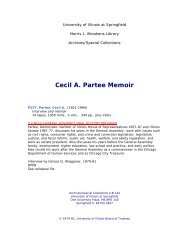Victor De Grazia Memoir - University of Illinois Springfield
Victor De Grazia Memoir - University of Illinois Springfield
Victor De Grazia Memoir - University of Illinois Springfield
Create successful ePaper yourself
Turn your PDF publications into a flip-book with our unique Google optimized e-Paper software.
Hyde said, "I'm with you on this." We had the votes, we counted them.<br />
We had the votes to prevent an override. Unfortunately however, when it<br />
came to the vote, for the override, Henry not only voted but made a<br />
speech supporting the override <strong>of</strong> the veto and the veto was overridden.<br />
Now Jerry Shea later told me that not only did he make Henry chbnge his<br />
vote, but that he had gestured to Henry to make sure that Henry had to<br />
stand up on the floor and make that speech. That to Jerry was sort <strong>of</strong><br />
the cream on the cake.<br />
Q: That CTA.bil1 was where Walker wanted Chicago to put in more money,<br />
is that what it was?<br />
A: Yes, well, there were various versions. Whether it should be a loan,<br />
whether it should be outright grant; and Daley had come down, and he and<br />
Pikarsky and Dan and I had lunch at the mansion and Daley had talked<br />
about how important the bill was etc, etc. Daley, I think, believed he<br />
was going to get it. And was shocked when Walker vetoed it.<br />
Q:<br />
That wasn't when Daley came down and spoke.<br />
A: No, that was the education . . .<br />
Q: Right.<br />
A: . . , that was some years later. Doug Kane was at that time head <strong>of</strong><br />
our legislative team. And he was the one who counted the votes and said.<br />
they were there, that got the override beaten. And it should have been;<br />
he just counted. If you looked at it, downstate would be against it and<br />
you needed three-fifths to override a veto, so it appeared a doable<br />
thing.<br />
Q: How did you see Walker's relationship with cabinet members, with<br />
agency directors?<br />
A: (long pause) Dan believed that the chief executive should run<br />
government. And he believed in what in business is called hands-on<br />
management, in which the top executive has his hands on everybody and<br />
knows what's going on. From observing other governors, they never liked<br />
to get involved that much in government and they let the departments just<br />
run by themselves. Thompson is a. classic example <strong>of</strong> that. But Walker<br />
got heavily involved in every budget and would meet with the director and<br />
go over the budget, with programs, with problems; and directors, I'd say,<br />
were probably ambivalent about that. They'd much prefer to be let alone<br />
to do their own thing rather than have somebody. . . .<br />
You how, it's a funny thing. A friend <strong>of</strong> mine still calls me "director"<br />
because when I was head <strong>of</strong> Economic <strong>De</strong>velopment under Kerner, he came<br />
down to <strong>Springfield</strong> to see me and I walked into a hotel and they said,<br />
"Oh, director, there's a phone call for you." And he was astonished,<br />
right? And when you become a director and all the fawning that ,starts<br />
taking place within the staff, all the restaurants, the hotels, everybody<br />
treats you . . . you know, you have a car or somebody drives you around,<br />
you how, that kind <strong>of</strong> thing is bad for a person's ego. That is, it<br />
inflates it.

















